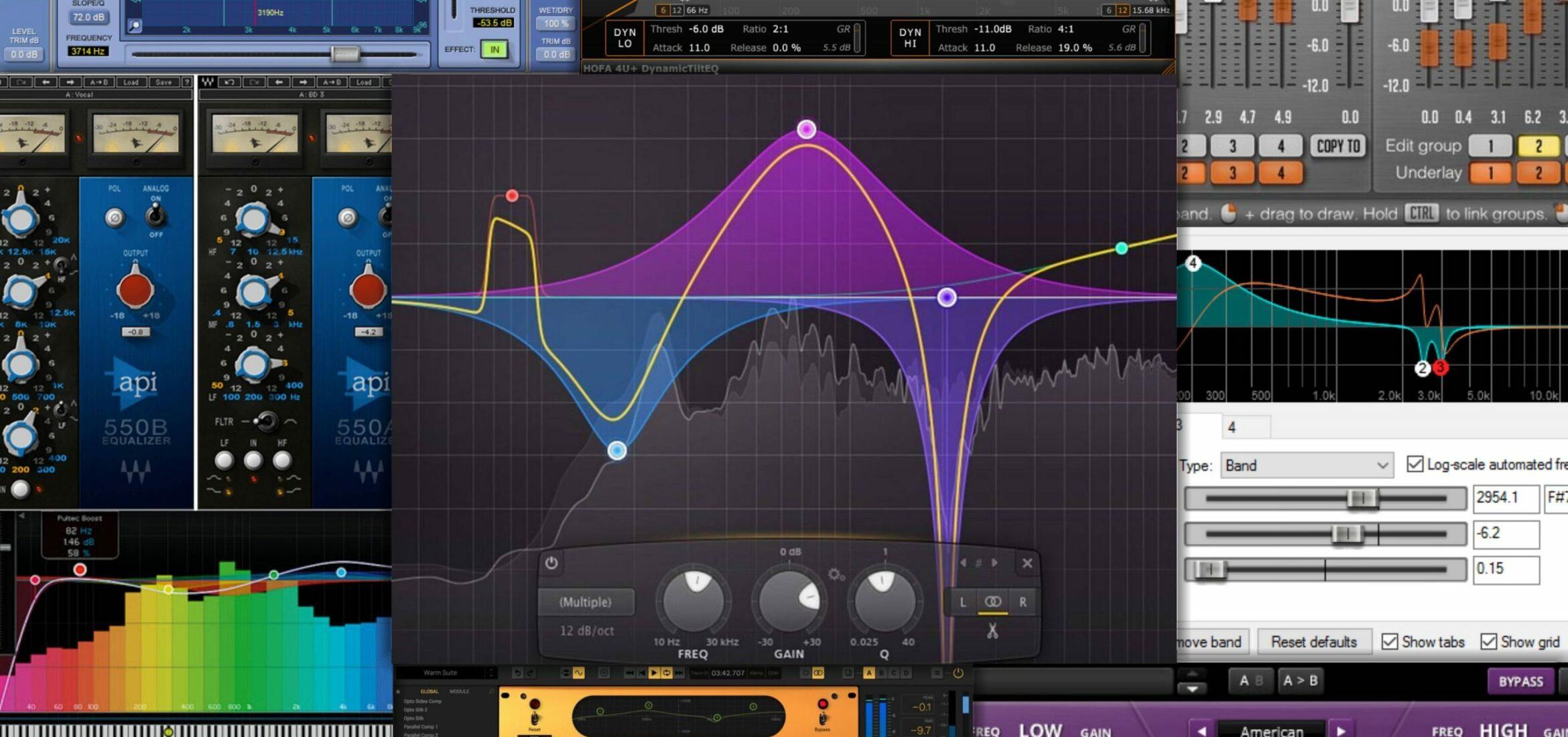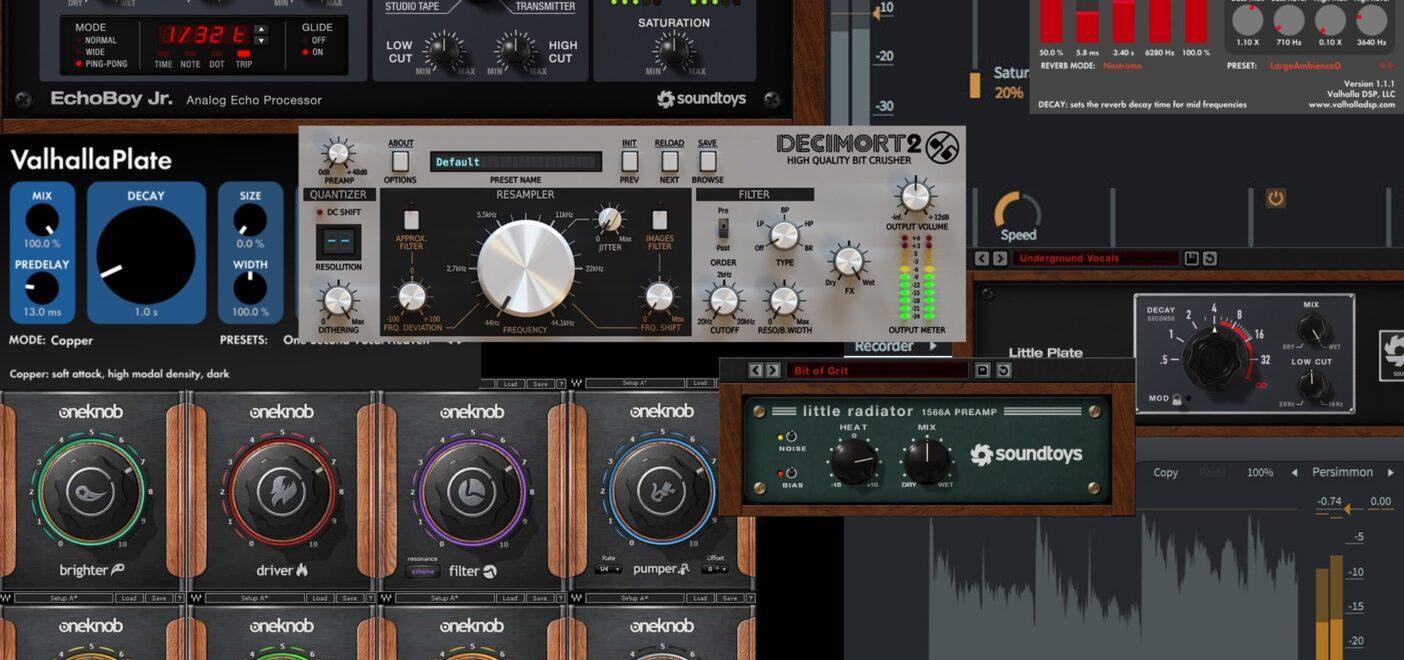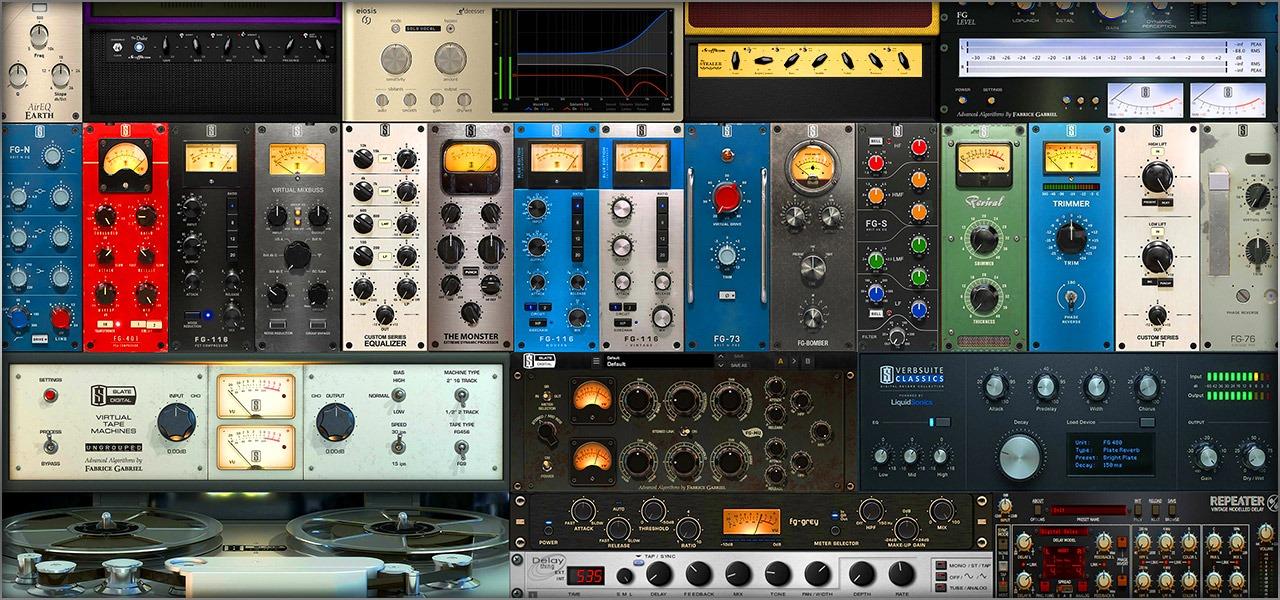Mixing with EQ is necessary for giving each mix element room to breathe and blend properly. Without proper equalization, instruments may bleed into one another, overpower each other, and ultimately coalesce into a muddy mix. By boosting or cutting specific frequencies from each track (or the mix as a whole), you’ll get the most out of each part of your mix and ensure that everything that’s meant to be heard is heard. Before Digital Audio Workstations (DAWs), EQing was done on analog mixing units, where audio was fed back to itself at certain frequencies to boost or cut said frequencies. While some studios still implement analog EQ, most utilize digital equalizers, which replicate the same process. Every DAW now comes equipped with at least one native EQ plugin, and there are thousands of external EQ plugins on the market. To save you some time, we compiled 11 of the best EQ plugins for Windows and/or Mac, some free and some paid. Have a look:
Best Free EQ Plugins for Windows Only
We’ll start with three of the best EQ plugins exclusively for Windows, all free. Side note: you’ll find that most new plugins are built for both Windows and Mac. However, because developers have an easier time coding for Windows, there are more plugins available solely for Windows than there are exclusively for Mac.
Modern Console EQ by Antress

Antress has developed a host of free plugins in its Modern series, including an exciter, compressor, and expander. As its name suggests, the Modern Console EQ replicates analog EQ consoles. It features an EQ In/Out and Phase switch, high-pass and low-pass filters, and four frequency bands for parametric EQ. The plugin also offers gain knobs for each of its bands. For those used to working with analog consoles, its controls are straightforward. This is a simple but useful free EQ plugin.
ReaEQ by Cockos
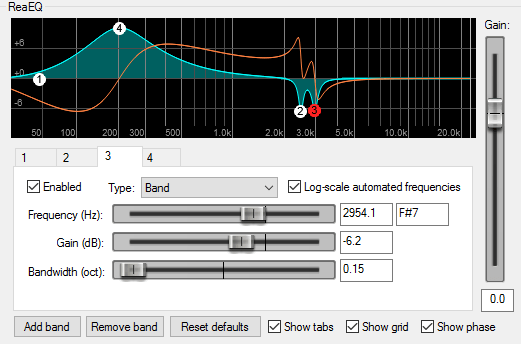
It might not look flashy, but the ReaEQ plugin gives you full intuitive control of the frequency spectrum. This free parametric EQ plugin is fully featured, offering unlimited bands and a large number of filter types, including notch, bandpass, and all-pass filters. The plugin’s display shows a spectral graph that you can easily manipulate with your mouse. Bandwidth, gain, and frequency for each band can be adjusted with dedicated sliders. There is also a master gain slider on the right-hand side.
Eq31 by Piotr Pyrzanowski

The “31” in the Eq31 plugin refers to the number of bands in this free digital graphic equalizer. From 20 Hz to 19k Hz, you can boost or subtract each band and adjust the Q factor, as well as the input and output gain. There isn’t much else to the plugin. Its simplicity and low CPU usage mean you shouldn’t run into any latency using it. This is a nice free tool to have in any DAW.
Best EQ Plugins for Both Windows and Mac
The vast majority of EQ plugins, free or paid, work on both Mac and Windows. Each plugin listed below works well for different scenarios. You might find that a graphic EQ serves an aspect of your mix better than a visual parametric EQ plugin, or vice versa. As such, these aren’t listed in any particular order. They’re simply some of the best EQ plugins you can download or buy.
Free
We’ll start with the freebies. All four of these free EQ plugins are wildly different in presentation and functionality. Each one is best used in certain situations, be it tone shaping, mastering, or precision mixing. But they’re all worth exploring. Plus, they’re free!
TrackS Classic Equalizer
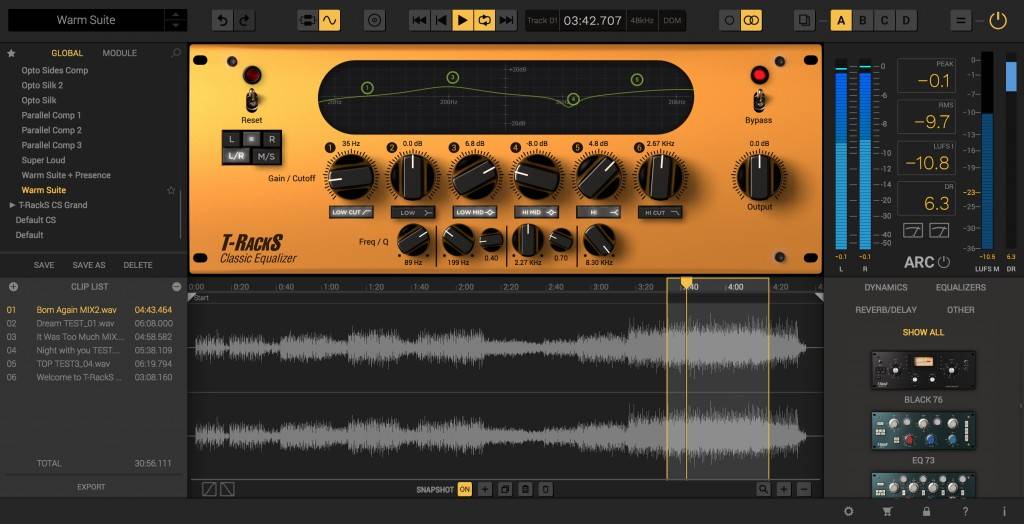
After examining its applications, depth of features, and sleek design, it’s hard to believe that the TrackS Classic EQ is a free plugin. It was developed with mastering in mind, but this 6-band EQ plugin works well for general-purpose EQing as well. Each band is designed with precision in mind, making it a powerful subtractive EQ tool, allowing you to cut out noisy, sharp frequencies. The plugin’s presentation is a bit dense, which might overwhelm new users. Still, once you get over the learning curve and tinker with it enough, you’ll find the TrackS EQ useful in many situations.
TDR VOS SlickEQ

You might remember this EQ plugin from our list of the 25 best free Mac plugins. Like the TrackS Classic EQ, the TDR VOS SlickEQ is great for both mixing and mastering purposes. The SlickEQ, however, takes a more simplistic approach in its presentation, making it the perfect EQ plugin for newcomers. There are just 3 bands to work with: low, mid, and high, each one with a frequency and gain knob. The low and high settings also feature two shaping/filter buttons. This semi-parametric plugin includes an auto-makeup gain feature that recognizes major changes in volume and compensates for them. The SlickEQ also features 4 output saturation modes. These replicate the tones of different types of analog EQ consoles. Overall, the TDR VOS SlickEQ offers more than meets the eye, and it’s become the go-to free EQ for many. Those who enjoy the plugin can upgrade to the paid “Gentleman’s Edition,” which features a spectral analyzer, tilt filter, and more.
Voxengo Overtone GEQ
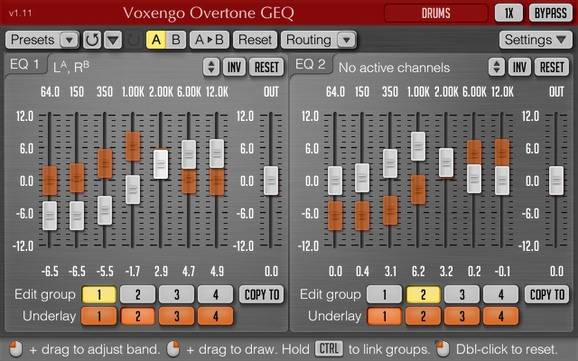
The Overtone GEQ is hands down one of the best free graphic equalizers available. It also doubles as an aural exciter, as it can enhance harmonic overtones for each of its 7 frequency bands. If you want to adjust the coloration of your mix, this is your tool. In terms of presentation, the plugin couldn’t be easier to use. Each band, from 64 Hz to 12k Hz, has a large gain slider ranging from -12 dB to +12 dB. You can use the Overtone GEQ for mid-side processing to better shape the stereo image of your mix. For such a simple-looking free plugin, the Overtone GEQ is incredibly versatile and useful in both mixing and mastering scenarios.
4U+ DynamicTiltEQ by Hofa
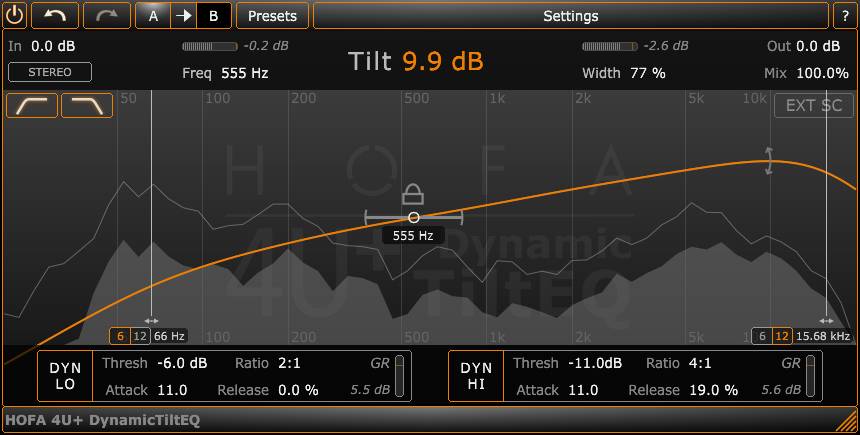
The 4U+ DynamicTiltEQ also made our list of the 25 best Mac-free plugins (it’s compatible with Windows as well). This unique plugin is a combination of a filter, equalizer, and dynamic compressor. You’re presented with a straight line overlaying a spectral analyzer. You can then move this line up or down (gain control) or tilt it to use as a high- or low-pass filter. You can then turn the line into a curve and adjust bandwidth for more precise parametric EQing. But the features don’t stop there. It’s named “Dynamic” for a reason. You can dynamically boost or filter out the lower and higher frequencies with this free plugin. Overall, this one is fun to play with and can add a lot of musicality to a mix if used properly.
Paid
Now let’s get into the plugins that aren’t free. The four plugins listed below are designed for professional use. If you lack experience with in-depth EQ tools, you’re best off downloading the aforementioned free plugins and figuring those out first. Once you gain some confidence, you can check out these options. Some of the plugins below also offer free trials or demo versions. It’s always a good idea to start with those before making a purchase.
EQuilibrium by DMG Audio ($274)
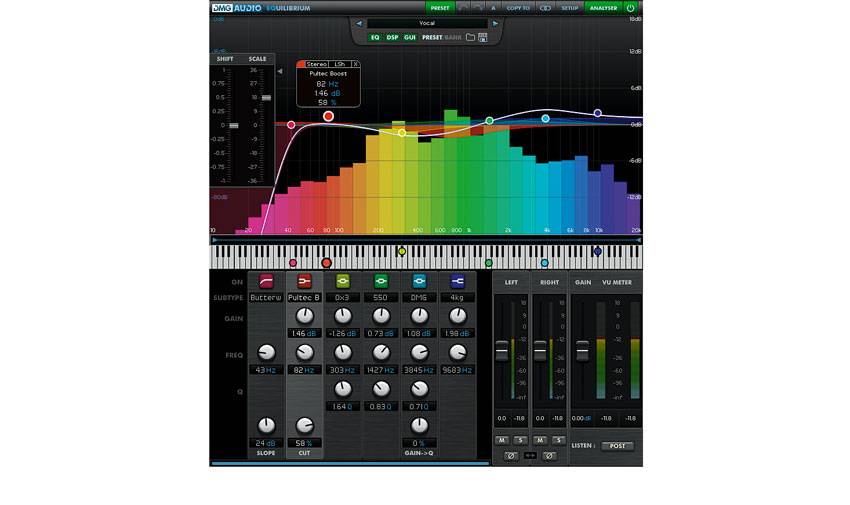
This is the EQ you want for serious professional use. The EQuilibrium by DMG Audio offers all the control, functionality, versatility, customization, and compatibility you could possibly want, and more. Its sheer breadth of features is too extensive to cover here, so we’ll just note a few key ones: low or high CPU usage options, customizable user interface, 32 EQ bands with several filters and a +/-36 dB range, several vintage EQ circuit models, plugin presets, and much more. The list goes on and on. In short, DMG Audio’s EQuilibrium simply offers more functionality than most of its competition. It doesn’t come cheap, but there’s a reason for that. This is an all-purpose EQ tool for those who know what they want and how to achieve it.
FabFilter Pro-Q 2 ($179)
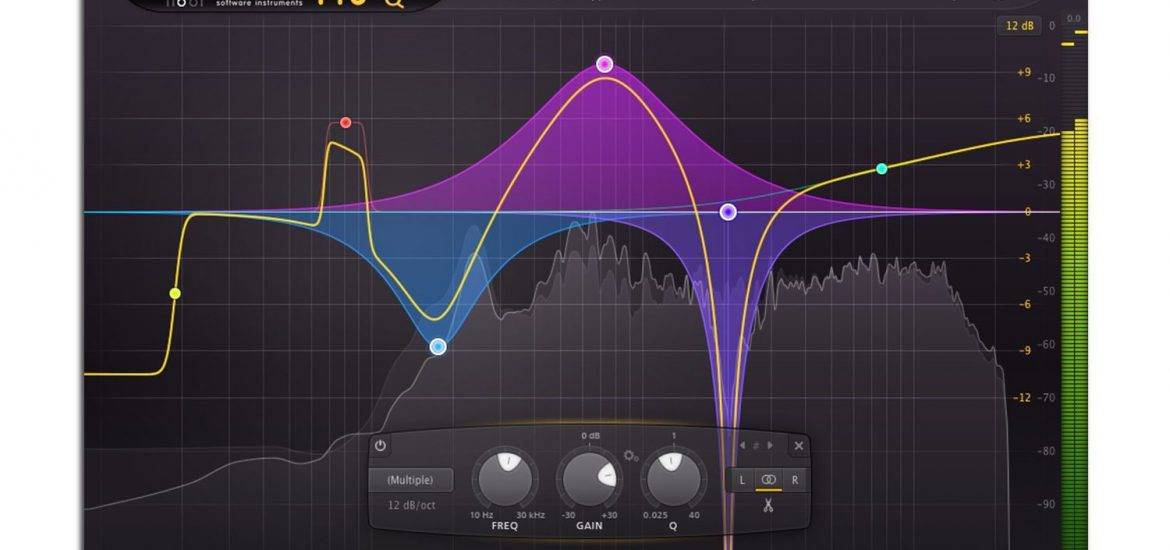
Many producers swear by the FabFilter Pro-Q 2 EQ plugin. This award-winning EQ makes our list not only for its number of features but also for its ease of use. This might be one of the advantages the FabFilter Pro-Q 2 has over the EQuilibrium. Its presentation is sleek, simple, and brilliantly designed. New users should be able to get the hang of it in little time. In terms of its features, this software has it all: 24 possible EQ bands, extremely high sound quality, zero latency mode option, a variety of filter shapes, auto gain and scaling, phase inversion, mid-side stereo processing, and more. It can be purchased on its own or as part of one of FabFilter’s several bundles. Or, if you want to try it for yourself at no charge, you can download a 30-day trial.
Waves API 550 ($249)
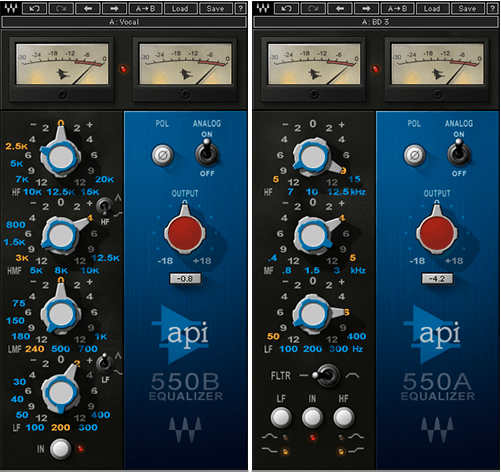
Waves has no shortage of incredible EQ plugins and analog emulations. Of course, we couldn’t list them all here. If you’re into EQ plugins that replicate analog consoles, you can’t go wrong with the Waves API 550. You’ll have a hard time finding the real API 550 consoles anymore (unless you’re willing to spend a few grand or more). So, this plugin is great for achieving that early rock and roll sound popularized in the ’60s and ’70s. The plugin is divided into two sections, the 550A and 550B. The former features 3 bands with 5 frequencies each. The latter has 4 overlapping EQ bands with 7 frequency centers each. If you’re considering grabbing this one, there’s no better time than Black Friday. It’s currently marked down from $249 to just $29 on Waves’ site! Hurry up!
Oxford SuprEsser by Sonnox ($122)
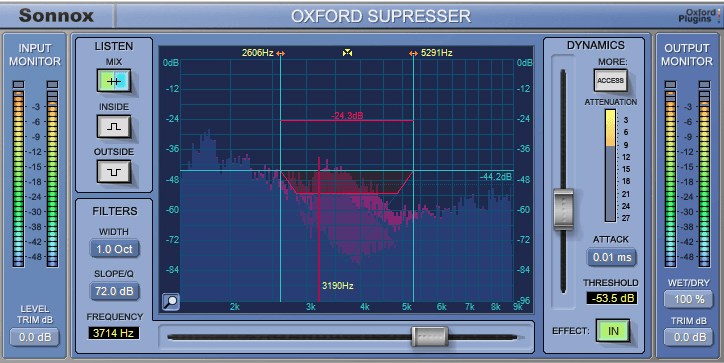
Lastly, we have the Oxford SuprEsser by Sonnox. If it wasn’t clear by its cheeky name, this plugin doubles as a DeEsser and Dynamic EQ. Its main purpose is to suppress harsh sounds and overtones in a mix. Admittedly, its user interface looks a bit outdated compared to the flash of the EQuilibrium and the elegance of the FabFilter Pro-Q 2. But what this plugin lacks in aesthetic appeal it makes up for in functionality. This is the perfect tool for shaping vocals and cutting out hissing sibilant sounds or violent plosives. It’s also effective at smoothing out harsh cymbal hits and removing clicks, pops, and crackles. You have more control here than with a typical DeEsser. In short, if it sticks out like a sore thumb, the SuprEsser can shut it down easily.
Conclusion
Truth be told, there are many more fantastic EQ plugins for Windows and Mac out there. These are just 11 of the best. You can spend a long time with any of these free or paid programs and get a lot out of them. Whether you’re just starting out or have years of experience and want to add more tools to your arsenal, take your pick. Getting good at EQing takes time, practice, and a lot of experimentation. The more you practice with plugins like these, the better you’ll get. So, what are you waiting for?
À propos de l'auteur

Ethan Keeley
Rédacteur, chanteur, musicien et monteur audioEthan Keeley est un musicien, un doubleur et un écrivain de Rochester, dans l'État de New York. Lorsqu'il n'est pas en tournée avec son groupe Unwill, il travaille sur de nouvelles chansons et histoires.
Laisse un commentaire
Connecte-toi pour commenter.
